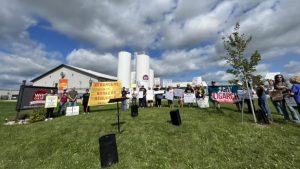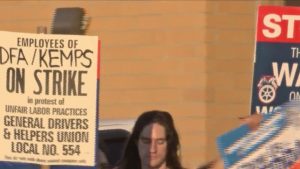
The new structure, which could hold up to 800 black and white Holstein cows, is part of a larger plan to expand the farm’s operations, he said.
“We have the infrastructure here, we have the team, so expanding, it just makes sense,” Hoekstra, 53, said, his eyes fixed on a row of cows as they grazed on a massive pile of feed. “If it doesn’t happen, we’ll look at other things. But I think we would be able to handle a 20% increase pretty easily.”
Hoekstra manages about 8,000 cows on his 2,290-acre farm, Hillcrest Dairy, located on a rural stretch of land just east of Merced. To the north, his farm overlooks the rugged foothills of the Sierra Nevada. But just two miles south lies the small, rural community of Planada, population 4,000, where some residents say the farm’s expansion would further degrade quality of life for a community already troubled by odor issues and poor air quality.
They fear the expansion could worsen the lingering stench caused by cow manure and increase the chances of finding elevated levels of nitrates in their groundwater supply.
“It gets not just in your nose, it gets into your lungs, and you just sit there, and it is foul,” longtime Planada resident Jerry Salcido said of the odors from the dairy.
But others say Hoekstra’s decades-long ties to the area and financial contributions to Planada make him a valuable member of the community. And while Hoekstra is seeking to install technology on his farm that could capture methane emissions and reduce the manure odor, environmental advocates say the technology itself could have a long-lasting adverse effect on nearby communities.
It’s an entrenched issue that showcases the tensions between industrial agriculture and the rural communities nearby.
California’s dairy industry is the nation’s largest, accounting for nearly 20% of the country’s dairy production and generating more than $7.47 billion a year in 2020 alone, according to the California Department of Food and Agriculture. Merced County is the second-largest dairy-producing county in the state, with milk being the county’s top agricultural commodity. The county’s dairy industry produced $1.05 billion in profits in 2020, representing 33.6% of the county’s agricultural production.
In the community of Planada, in comparison, about 28% of residents live below the poverty line. The median household income in the 98% Hispanic community is about $46,800.
John Pedrozo, a former chairman of the Merced County Board of Supervisors who represented the district that includes Planada, is familiar with the friction between the dairy and some residents.
“There are times when the smell is going to be stronger and so a lot of people would say that it gets so bad,” Pedrozo said. “But the positive news is that Mr. Hoekstra has gone above and beyond and spent a lot of money to try to keep the neighbors at bay and continue to operate a state-of-the-art facility.”
PROPOSED EXPANSION WOULD MAKE MERCED COUNTY DAIRY MORE ‘EFFICIENT’
Hoekstra grew up on a dairy farm in Riverside County before venturing out to the Central Valley, where he opened Hillcrest Dairy in 2002. The proposed expansion would allow him to increase his dairy operations by 1,700 cows and young stock, bringing his total herd to 9,750.
The project includes constructing 195,678 square feet of new support buildings, which will be used to shelter the cattle, within the existing acreage of the farm. Both the existing dairy and the proposed expansion would be on approximately 200 acres of the 2,290-acre farm.
Hoekstra, who comes from a long line of dairy farmers, takes pride in continuing the family tradition that has spanned generations. Despite the challenges, he hopes growing his dairy operations will better prepare his three sons, two of whom have agricultural degrees, to carry on the business.
“Eventually I’d like to step away and this (expansion) allows the dairy to be more efficient,” he said.
Hoekstra said the expansion is motivated in part by the many challenges he’s weathered over the past few years due to the pandemic and drought. Many of his employees got sick with COVID-19 early on in the pandemic. The price of essential items such as feed also dramatically increased at a time when the market rate price for milk plummeted.
The drought led many local producers to stop growing some water-intensive crops like alfalfa and corn silage, which Hoekstra uses to feed his herd. This means he now pays a higher price if he buys them from an out-of-state producer.
“We have to weigh those costs of what we’re getting for our milk price with the cost that we have to pay for in feed,” he said. “So we’re actually very vulnerable.”
The market price of milk has increased substantially, but feed costs also continue to rise — which means profit margins still remain slim, Hoekstra said. Expanding would allow the farm to produce more milk and offset some of the rising costs, he added. He compared it to planting more crops in a field or squeezing more tables into a restaurant.
“Our goal is to be more efficient, and I think with more animals, then we can be more efficient,” he said. “I wouldn’t even have attempted to submit an expansion application if I knew that we couldn’t handle it.”
PLANADA RESIDENTS CONCERNED ABOUT POLLUTION FROM COWS
David and Rita Rodriguez live about two miles away from Hoeksta’s dairy. They’ve lived in their Planada home, located across the street from the local middle school, for about 25 years. While the dairy odor isn’t an around-the-clock problem, they say, it’s still a nuisance that affects their quality of life.
As he sat in a chair in his grassy backyard on a late March afternoon, David Rodriguez recalled the first time, about a decade ago, that he got a whiff of the dairy.
“I was out here in the back,” David Rodriguez, 66, said. “I could smell it and, excuse my Spanish, but it was cow manure.”
Recently, the couple recalled hosting a movie night in their backyard. Nearly 30 people — family, friends and neighbors — were sitting on chairs and blankets on the lawn, snacking on finger foods and popcorn while watching “Pete’s Dragon” and other movies. Then, the smell wafted in.
“Nobody wants to sit and enjoy a hot dog while there’s this smell in the air that is just putrid,” Rita Rodriguez, 67, said.
DAIRY EXPANSION
Hillcrest Dairy plans to add additional barns and expand its herd by 1,700 cattle within its 200-acre footprint north of Planada in Merced County. It would bring the total number of animals on the site to about 9,750.
Salcido, 62, was born in a farm labor camp in Planada and has lived in the rural community for most of his life. He inherited his parent’s home and now rents it to tenants. He said the odor has led several renters to leave after just a few months. “Some of them have mentioned that they can’t stand the smell,” he said.
Salcido said the odor also causes him anxiety. Sometimes, he will be visiting with friends or family from out of town when the odor rolls in like a wave. He ushers everyone inside the house, he said, but he’s still left feeling embarrassed, angry and powerless to fix the problem.
“It’s awful,” he added.
Over the years many of Planada’s residents have grown disappointed, David Rodriguez said, because nothing has changed — and they fear the situation is going to get worse if the dairy expands. Along with concerns about the odor becoming more severe or frequent, he is also concerned that more cows could increase the likelihood of nitrate pollution in the town’s drinking water.
“The more cows they have, the more it can become a dangerous issue,” he said.
Nitrate-contaminated water is a widespread problem that affects residents throughout the state that could lead to serious health issues. Agricultural fertilizers and animal waste on farmland are “by far the largest regional sources of nitrate in groundwater,” according to a UC Davis report commissioned by the California Water Resources Control Board.
The Central Valley is more susceptible to nitrate contamination because groundwater serves as the primary source of drinking water for nearly 90% of residents. The Valley counties of Fresno, Madera, Merced, Kern, Kings, San Joaquin, Stanislaus, and Tulare, have some of the highest rates of water contamination per person in the state, according to a separate report from the Community Water Center, an nonprofit organization that advocates for safe drinking water in vulnerable communities.
In response to concerns about water pollution, Hoekstra said cow manure is heavily regulated. The manure, soil and nearby wells are also regularly tested to measure nitrate levels.
Madeline Harris is a regional policy manager with Leadership Counsel for Justice and Accountability, an advocacy organization based in the Central Valley. She said the dairy poses other significant public health and environmental concerns. The dairy’s water consumption poses a problem for the region’s depleting groundwater reserves, she said, and its operations emit methane.
“These are huge problems,” she said. “We’re really seeing this pattern of factory farm dairies becoming larger and larger, but we’re not seeing meaningful community engagement in Merced County with all these proposed dairy expansions.”
MERCED COUNTY DAIRY FARMER CONTRIBUTES TO COMMUNITY
But some residents say occasional agricultural odors are expected in rural areas, and that Hoekstra mitigates the problem by playing an active role in the community and regularly donating to school and charity functions.
Alicia Rodriguez, 56, no relation to David and Rita Rodriguez, has lived in Planada for 37 years and has known Hoekstra for several years. She said he regularly makes an effort to provide farm jobs to locals and also donate funds to the local church and schools.
“A lot of people don’t realize that (Hoekstra) has done a lot for this community,” she said. “He gives to any program there is for kids and is constantly giving money to Planada. He gives back to the community and I think that’s very, very important.”
She said she is not bothered by the dairy farm and sees no problem with the expansion. She said the odor is just “part of what it means” to live in a rural area.
“When you live in the country, you take what comes with it,” she said. “I have no concerns or issues with the dairy farms because I live in a farming community.”
Ildefonso Nava was born in Planada and now lives on the outskirts of town. He is the principal at Cesar E. Chavez Middle School and said Hoekstra has “always been supportive” of Planada and its residents. Recently, Hoekstra donated labor and equipment to help the school construct the new soccer and track field, he said.
“It’s not just about him making money and keeping the money, he does contribute back into the community,” he said. “I cannot remember one single instance where he has not supported our ventures or endeavors when we have asked for it.”
Rita Rodriguez said she recognizes that Hoekstra contributes positively to the community, by providing turkeys during Thanksgiving and holiday baskets at Christmastime. But she said that shouldn’t justify them tolerating the odor and “having to live this way.”
“Planada isn’t for sale,” she said. “We don’t want to give them that edge, that he can buy us off with Christmas baskets and toys for kids.”
FARMER HOPES DIGESTER WILL REDUCE MANURE ODOR
Hoekstra acknowledged that some residents are upset about the smell of the odor. To mitigate the smell, he uses a solids separator. Separating solids from the liquid manure makes the mixture easier to process and handle, and helps reduce the intensity of the odor.
He said he tries to be a helpful resource to the community and is “sensitive” to their concerns.
“I don’t want to make anybody’s life miserable, I live in this area too,” he said. “I don’t want to be a nuisance to our community. I want to be an asset.”
He said he’s been looking into investing in new sustainable technologies to help with manure management and odor control, including an anaerobic digester.
Currently, most dairy farmers manage manure by storing it in lagoons. Farmers use the lagoons to remove fecal matter and urine from the cows’ living area to ensure it is sanitary for the animals. A digester works by trapping the methane formed in the lagoon with a large covering. Once trapped, the gas can be converted into a form of biofuel that can be pumped into natural gas pipelines or used for vehicle fuel.
Manure digester systems can provide other benefits, too. They can reduce odors from livestock manure. Digesters have also been shown to “help protect local water resources by reducing nutrient run-off and destroying pathogens,” according to the U.S. Environmental Protection Agency.
The state is offering a financial incentive to farmers who want to implement the technology and for many, it’s an increasingly appealing option.
Hoekstra said he is “very serious” about investing in the digester. Hoekstra has a signed letter of intent with a digester company and is currently waiting on additional details on the design and cost. He’s hopeful that the technology will decrease the odor.
“The technology is really, really exciting,” he said. “You’re helping the environment and you’re greatly reducing your carbon footprint.”
Still, some advocates say digesters may do more harm than good for a community and the environment.
Harris, of the Leadership Counsel for Justice and Accountability, said dairy digesters “don’t actually address” the community’s concerns and still pose a threat to the environment.
She said covering a manure lagoon does not reduce the amount of groundwater that the dairy would have to use to sustain its operations or address water contamination concerns. She also said the biofuel produced by a digester “further ingrains our reliance on fossil fuels because dairy biomethane burns the same as natural gas.”
County officials are in the midst of drafting an environmental impact report for the proposed expansion.
Planada resident David Rodriguez, meanwhile, isn’t sure if the digesters will address the community’s concerns about odor. But if the project is eventually approved, he said the community won’t be left with many options.
“Suffer,” he said. “That’s what we’ll do — suffer.”

























